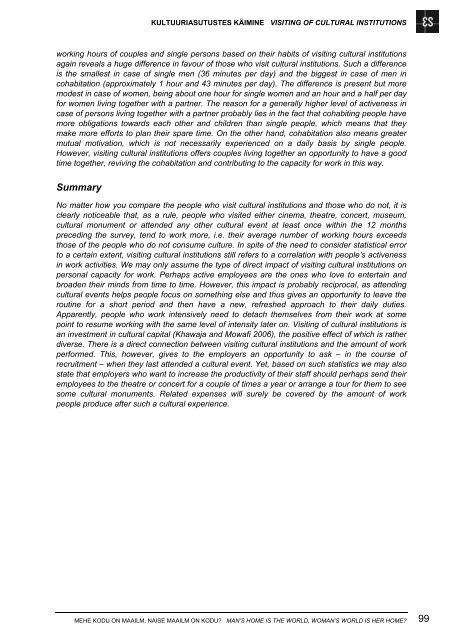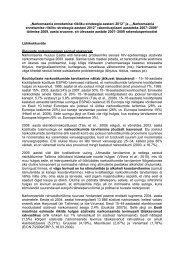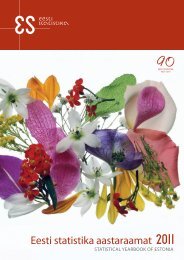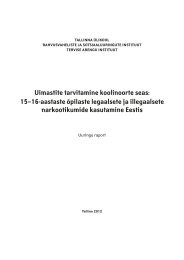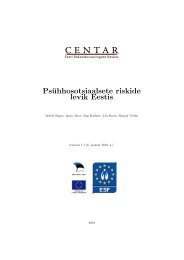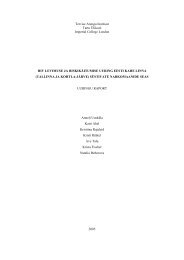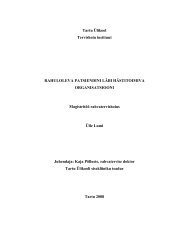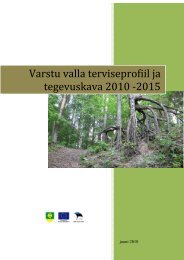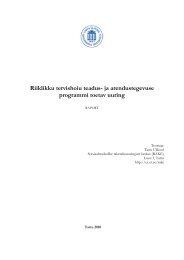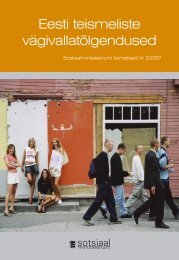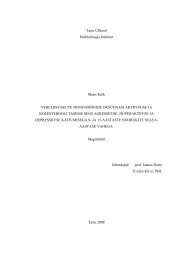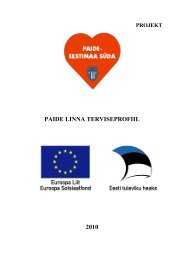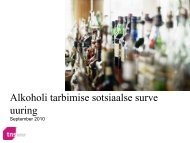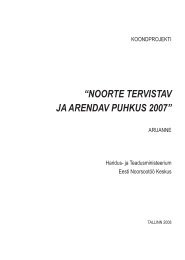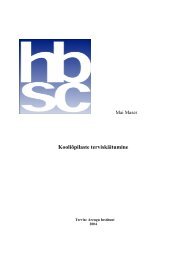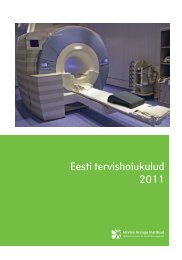MEHE KODU ON MAAILM, NAISE MAAILM ON KODU? - Tartu Ãlikool
MEHE KODU ON MAAILM, NAISE MAAILM ON KODU? - Tartu Ãlikool
MEHE KODU ON MAAILM, NAISE MAAILM ON KODU? - Tartu Ãlikool
Create successful ePaper yourself
Turn your PDF publications into a flip-book with our unique Google optimized e-Paper software.
KULTUURIASUTUSTES KÄIMINE VISITING OF CULTURAL INSTITUTI<strong>ON</strong>S<br />
working hours of couples and single persons based on their habits of visiting cultural institutions<br />
again reveals a huge difference in favour of those who visit cultural institutions. Such a difference<br />
is the smallest in case of single men (36 minutes per day) and the biggest in case of men in<br />
cohabitation (approximately 1 hour and 43 minutes per day). The difference is present but more<br />
modest in case of women, being about one hour for single women and an hour and a half per day<br />
for women living together with a partner. The reason for a generally higher level of activeness in<br />
case of persons living together with a partner probably lies in the fact that cohabiting people have<br />
more obligations towards each other and children than single people, which means that they<br />
make more efforts to plan their spare time. On the other hand, cohabitation also means greater<br />
mutual motivation, which is not necessarily experienced on a daily basis by single people.<br />
However, visiting cultural institutions offers couples living together an opportunity to have a good<br />
time together, reviving the cohabitation and contributing to the capacity for work in this way.<br />
Summary<br />
No matter how you compare the people who visit cultural institutions and those who do not, it is<br />
clearly noticeable that, as a rule, people who visited either cinema, theatre, concert, museum,<br />
cultural monument or attended any other cultural event at least once within the 12 months<br />
preceding the survey, tend to work more, i.e. their average number of working hours exceeds<br />
those of the people who do not consume culture. In spite of the need to consider statistical error<br />
to a certain extent, visiting cultural institutions still refers to a correlation with people’s activeness<br />
in work activities. We may only assume the type of direct impact of visiting cultural institutions on<br />
personal capacity for work. Perhaps active employees are the ones who love to entertain and<br />
broaden their minds from time to time. However, this impact is probably reciprocal, as attending<br />
cultural events helps people focus on something else and thus gives an opportunity to leave the<br />
routine for a short period and then have a new, refreshed approach to their daily duties.<br />
Apparently, people who work intensively need to detach themselves from their work at some<br />
point to resume working with the same level of intensity later on. Visiting of cultural institutions is<br />
an investment in cultural capital (Khawaja and Mowafi 2006), the positive effect of which is rather<br />
diverse. There is a direct connection between visiting cultural institutions and the amount of work<br />
performed. This, however, gives to the employers an opportunity to ask – in the course of<br />
recruitment – when they last attended a cultural event. Yet, based on such statistics we may also<br />
state that employers who want to increase the productivity of their staff should perhaps send their<br />
employees to the theatre or concert for a couple of times a year or arrange a tour for them to see<br />
some cultural monuments. Related expenses will surely be covered by the amount of work<br />
people produce after such a cultural experience.<br />
<strong>MEHE</strong> <strong>KODU</strong> <strong>ON</strong> <strong>MAAILM</strong>, <strong>NAISE</strong> <strong>MAAILM</strong> <strong>ON</strong> <strong>KODU</strong>? MAN’S HOME IS THE WORLD, WOMAN’S WORLD IS HER HOME? 99


